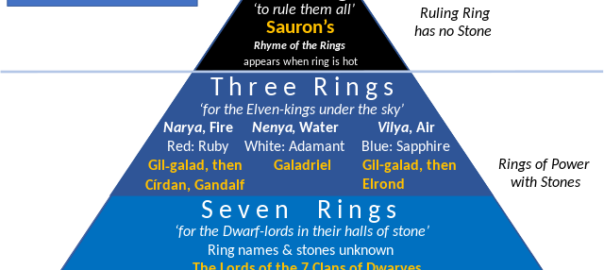By Kent R. Kroeger (Source: NuQum.com, September 8, 2022)
This is not a movie or TV series review. I’m not a Tolkienista by any definition. I reluctantly read The Hobbit in high school (and didn’t love it), ushered my children into all three of The Lord of the Rings movies (because I believed in their potential cultural significance — and they happened to be great movies!), and attended The Hobbit trilogy movies by myself because no one else in my family was interested. I’m a casual fan of J. R. R. Tolkien’s The Lord of the Rings franchise who honestly can’t tell the difference between Rivendell, Minas Tirith, and Osgiliath.
Now for my actual analysis…
Amazon.com, Inc. generated $470 billion in revenue in 2021 and, with over 1.6 million employees, is the 10th largest employer in the world.
Originally, Amazon focused on e-commerce, cloud computing, and artificial intelligence. It is not an exaggeration to say it is one of the most influential companies in the past 20 years.
And, in 2010, Amazon decided that e-commerce, delivering packages and building cloud services was not enough. They also wanted to develop television shows and produce films which would be distributed through theaters and Amazon’s proprietary streaming service, Amazon Prime.
Amazon won its first Oscars in 2017 with Casey Affleck winning for Best Actor and Kenneth Lonergan for Best Original Screenplay in the movie “Manchester.”
Given its sheer financial size, Amazon was an immediate player in Hollywood. So when the company decided to buy the rights to the appendices of The Lord of the Rings: The Return of the King for $250 million in 2017, the buzz immediately shifted to what Amazon would create with their new acquisition.
The answer would be The Lord of the Rings: The Rings of Power (TRP), which premiered on Amazon Prime on Sept 1st.
Amazon has already declared the premiere of their new Lord of the Rings series a success based on their own, tightly controlled, viewing numbers.
The Hollywood Reporters’ Rick Porter however noted: “As for context, there’s little to go on: Prime Video reps declined to say whether that’s an average viewership worldwide on day one, the number of people who watched at least a few minutes of the series, or something else. Nor is there any indication of how much bigger The Rings of Power was than the previous record holder on Prime Video (or what that show was).”
That is the essence of audience statistics in today’s streaming world. It’s mostly self-promoting propaganda.
But we are endowed with independent measures of audience interest, particularly Google’s open-source search data, which gives us a more nuanced story about TRP.
And, bless our luck, we have a real-time comparison case to TRP — it is HBO’s House of the Dragon miniseries, a prequel to the ultra-successful Game of Thrones (2011–2019), which debuted August 21st.
According to Google Trends, which analyzes the popularity of top search queries in Google Search, in the week TRP debuted, it was 76 percent more interesting to Google searchers than The House of the Dragon (see Figure 1).
Figure 1: Google Trends search levels for The Rings of Power versus The House of the Dragon from August 30 to September 6, 2022.
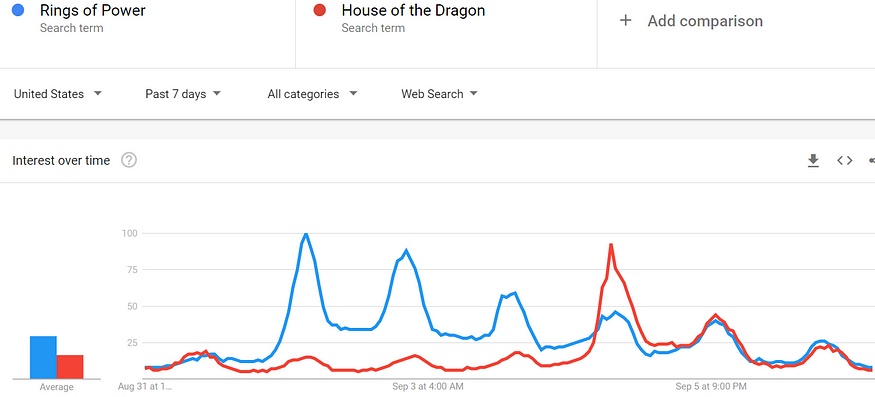
But when comparing Google Trends interest between the premiere week of The House of the Dragon to the premiere week of TRP (see Figure 2), The House of the Dragon was almost three times more interesting to Google searchers than the premiere of TRP.
Figure 2: Google Trends search levels for The Rings of Power versus The House of the Dragon from August19 to September 6, 2022.
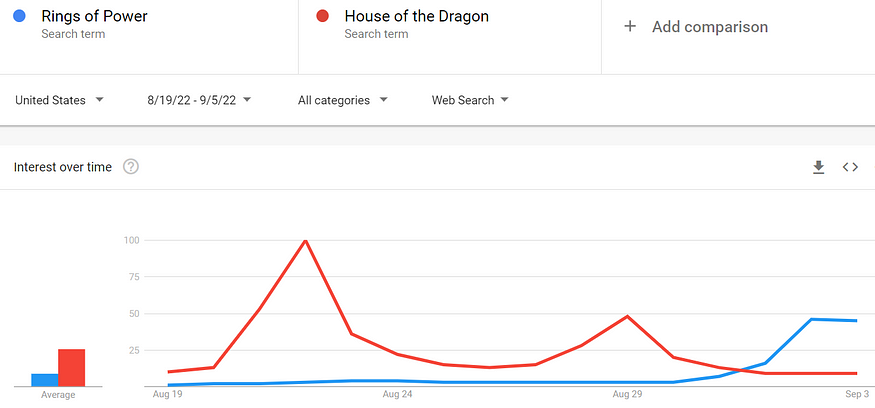
Breathless declarations, particularly among J. R. R. Tolkienists (and Elon Musk), that TRP has already failed are premature.
But TRP’s initial audience interest numbers are not what Amazon wanted to see when they decided to spend $500 million dollars on producing the series.
As of now, The House of Dragons is a bigger media phenomenon than TRP. This fact could change if subsequent TRP episodes help grow its audience, but when it comes to the premiere weeks of TRP and The House of Dragons, the latter is the clear winner.
To long time observers of the Game of Thrones and Lord of the Rings franchises, Amazon was facing an uphill task in trying to produce a prequel TV series for The Lord of the Rings more popular than a prequel series for the Game of Thrones.
Since the end of Peter Jackson’s The Lord of Rings trilogy in 2004, HBO’s The Game of Thrones franchise is twice as interesting to Google searchers (see Figure 3).
Figure 3: Google Trends search levels for The Rings of Power versus The House of the Dragon from January 1, 2004 to September 7, 2022.
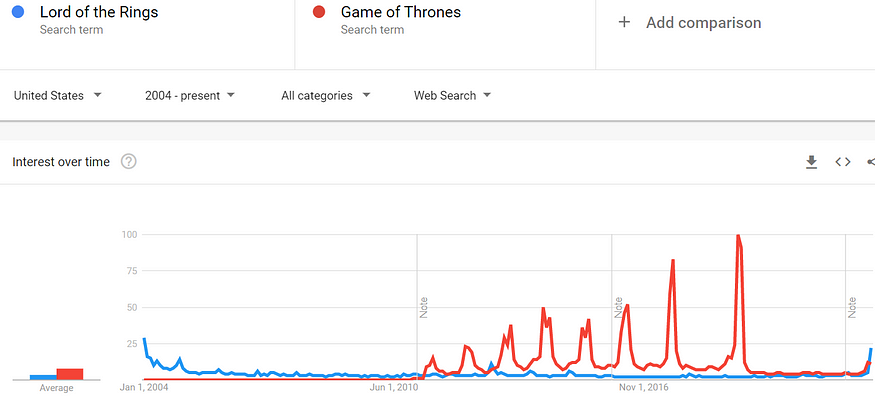
And when compared to Google search interest in the Star Wars and Harry Potter franchises, the Game of Thrones and Lord of the Rings are, together, in a second-class status (see Figure 4).
Figure 4: Google Trends search levels for Star Wars, Harry Potter, The Rings of Power and The House of the Dragon from January 1, 2004 to September 6, 2022.
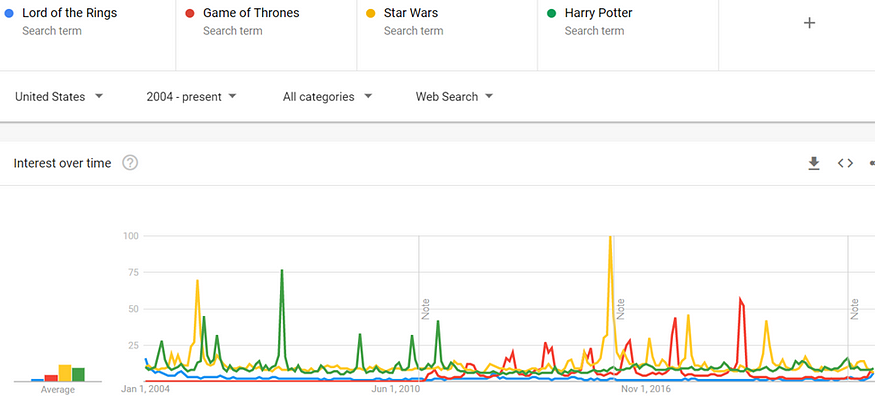
Since 2004, Harry Potter and Star Wars are twice as popular as Game of Thrones and The Lord of the Rings.
If you want to build a marketable media property for the future, the easiest launching pad would be Star Wars or Harry Potter.
The least obvious choice would be J. R. R. Tolkien’s Lord of the Rings franchise.
To Jeff Bezo’s credit, he chose a more difficult path to a media phenomenon.
The next weeks and months will tell us if Bezo’s gamble was worth it.
- K.R.K.
Send comments to: kroeger98@yahoo.com
